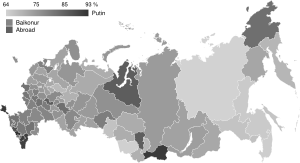
Back Russiese presidentsverkiesing, 2018 Afrikaans الانتخابات الرئاسية الروسية 2018 Arabic Прэзідэнцкія выбары ў Расіі (2018) Byelorussian Прэзыдэнцкія выбары ў Расеі 2018 году BE-X-OLD Президентски избори в Русия (2018) Bulgarian Prezidentské volby v Rusku 2018 Czech Präsidentschaftswahl in Russland 2018 German Ρωσικές προεδρικές εκλογές (2018) Greek Elecciones presidenciales de Rusia de 2018 Spanish 2018. aasta Venemaa presidendivalimised Estonian
The article's lead section may need to be rewritten. (January 2024) |
| |||||||||||||||||||||
| Opinion polls | |||||||||||||||||||||
| Registered | 109,008,428 | ||||||||||||||||||||
|---|---|---|---|---|---|---|---|---|---|---|---|---|---|---|---|---|---|---|---|---|---|
| Turnout | 67.50% ( | ||||||||||||||||||||
| |||||||||||||||||||||
 Results by federal subject | |||||||||||||||||||||
| |||||||||||||||||||||

Presidential elections were held in Russia on 18 March 2018. Incumbent president Vladimir Putin was eligible to run. He declared his intent to do so on 6 December 2017 and was expected to win. This came following several months of speculation throughout the second half of 2017 as Putin made evasive comments, including that he had still not decided whether he would like to "step down" from the post of president, that he would "think about running", and that he "hadn't yet decided whether to run for another term". Different sources predicted that he would run as an independent to capitalize more support from the population, and although he could also have been nominated by the United Russia party as in 2012, Putin chose to run as an independent. Among registered voters in Russia, 67.5% voted in the election.
There were allegations of widespread electoral fraud, including ballot box stuffing, forced voting, and threats against election observers. A video widely shared online showed people stuffing papers into ballot boxes. In addition, critics of Putin were barred from running.[1]
Putin won re-election for his second consecutive (fourth overall) term in office with 77% of the vote. Vladimir Zhirinovsky from the Liberal Democratic Party was the perennial candidate, having unsuccessfully run in five previous presidential elections. Other candidates included Pavel Grudinin (Communist Party), Sergey Baburin (Russian All-People's Union), Ksenia Sobchak (Civic Initiative), Maxim Suraykin (Communists of Russia), Boris Titov (Party of Growth) and Grigory Yavlinsky (Yabloko). Anti-corruption activist Alexei Navalny announced his intent to run in December 2016 but was barred from doing so due to a prior criminal conviction, which was widely seen as politically motivated,[2][3][4] for corruption. Consequently, Navalny called for a boycott of the election. He had previously organized several public rallies against corruption among members of Putin's government.
- ^ https://www.bbc.co.uk/news/world-europe-42479909
- ^ "Alexei Navalny: Russian opposition leader found guilty of embezzlement". theguardian.com. 8 February 2017. Archived from the original on 25 August 2024. Retrieved 26 November 2018.
- ^ "Russian opposition leader's fraud conviction arbitrary, Europe's top rights court says". reuters.com. 17 October 2017. Archived from the original on 26 November 2018. Retrieved 26 November 2018.
- ^ "Alexei Navalny: Russia's vociferous Putin critic". bbc.com. 15 March 2018. Archived from the original on 17 February 2024. Retrieved 26 November 2018.


